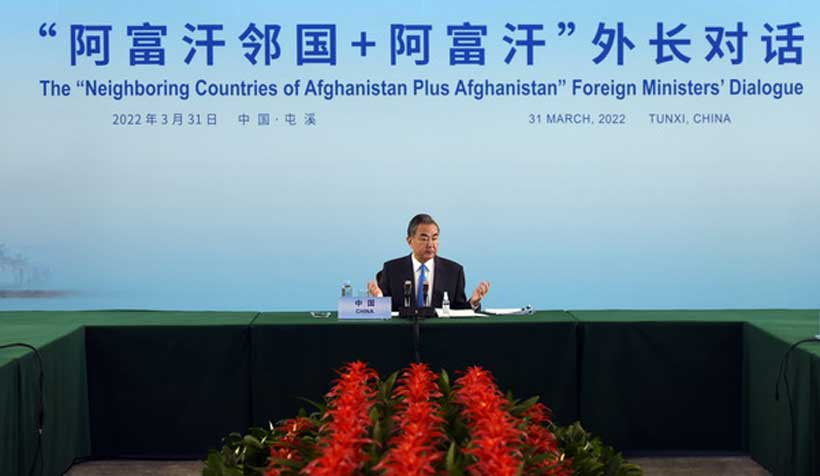In March this year, China hosted third summit of Afghanistan’s neighbours’ foreign ministers. Ministers or senior representatives of seven countries Iran, Pakistan, Russia, Tajikistan, Turkmenistan and Uzbekistan attended the meeting. Alongside of the summit, China also initiated a new dialogue called “Neighboring Countries of Afghanistan Plus Afghanistan” Foreign Ministers’ Dialogue”, where Foreign Ministers and delegates from member states of the mechanism for coordination and cooperation among Afghanistan’s neighbouring countries, as well as Afghan Interim Government Acting Foreign Minister Amir Khan Muttaqi, attended the meeting. Sheikh Mohammed bin Abdulrahman Al Thani, Qatar’s Deputy Prime Minister and Foreign Minister, and Retno Marsudi, Indonesia’s Foreign Minister, attended the meeting as guests. Those summit could be considered as a part of China’s summit diplomacy in Central Asia. In order to bolster China’s presence in the regional order, China often engages itself with multilateral regional summits. By holding the summit on Afghanistan, China shows its willingness to play the leading role Afghan Crisis, followed by the US withdrawal. China’s interest in Afghanistan is diverse, ranging from domestic security concern to economic and regional interest. The timing of this summit however also suggests that China is eager to show its concerns for international crises as the country has faced unprecedented criticism due to its close association with Russia and its position over Ukraine Crisis.
China’s Neighborhood Dialogue and Impact of Ukraine Crisis: Sovereignty in Afghanistan but not in Ukraine
Even if the Chinese side would not recognize it openly, the Ukraine Conflict and the strong alliance between the US and Europe over the crisis appeared to threaten China. China’s international image is damaged on the global stage when the international community debates China’s position on Ukraine and criticizes China for siding with Russia. The conflict in Ukraine has forced China to consider what role it should play. When it comes to external invasion or humanitarian intervention to protect the citizens of any such country in need, such as African countries with civil wars, Myanmar, and Afghanistan, the Chinese government, which always plays the “state-sovereignty” card in any internal crisis of states, did not have that option in the Ukraine Crisis. China’s official position on Ukraine, which was released on February 26th, stated that “all states’ (including Ukraine’s) sovereignty and territorial integrity should be respected and protected according to the UN Charter,” however China’s statement contradicts itself.
If China truly means what it claims in its statement, which is to defend Ukraine’s sovereignty, it must likewise reject Russia’s invasion of Ukraine. Although Chinese diplomats at the United Nations avoided using the word “state sovereignty,” it should be noted that during the early stages of the Ukraine Crisis, China’s ambassador to Ukraine stated that China respected Ukraine’s independence and territorial integrity. However, with statements like “China opposes the invocation of UN Charter Chapter VII that authorises the use of force and sanctions in United Nations Security Council (UNSC) resolutions, but believes that the UNSC should play a constructive role in resolving the Ukraine issue,” China’s questionable attitude toward the concept of state sovereignty is evident.
China’s diplomacy, particularly with developing countries, is heavily reliant on “image-building.” With the Ukraine crisis, it is more crucial than ever for China to be on the good side of at least some of those countries. Chinese policymakers are already wary about the Quad and Pacific alliance’s potential impact on China in the near future. With the exception of India, the Ukraine crisis appears to have brought quad members closer together. Wang Yi’s unexpected visit to India and invitation to Indian Prime Minister Narendra Modi to join the BRICS meeting could be considered as an opportunity for Beijing to enlist India’s support, as both countries remain neutral on Ukraine. China is likewise anxious about the US-EU alliance. There were no joint announcements or specific agreements struck during the recent EU-China conference. Since last year, when the EU imposed sanctions on China due to the human rights situation in Xinjiang, China has had a tumultuous relationship with the EU. During the summit, the EU also urged China to refrain from assisting Russia, which might undermine Western sanctions against Moscow. China’s trade blockade against Lithuania for having a Taiwanese representative office has heightened tensions between China and the European Union. As a result, China is concerned that if the EU aligns more closely with the US, China’s trade relationship with the EU, as well as large projects such as the Belt and Road Initiative, will be jeopardized. The EU is China’s largest trading partner and most EU countries are part of BRI.
Thus, the best bet for Chinese policymakers right now is to shift the conversation elsewhere, where China can also condemn the West, particularly the United States, for its “misdoings.” The US sanctions on Afghanistan have been denounced by China as ruthless misappropriation of Afghan assets. Besides, the scholarly and foreign policy circles of the West and particularly Japan and Taiwan, are debating if the Ukraine War will repeat itself in the Taiwan Strait. The pressure on China to maintain its status as a “responsible power” is paramount. Thus, with statements such as “we should urge the international community not to neglect the Afghan issue while focusing on the Ukraine issue, and continue to increase input in Afghanistan to help the Afghan people tide over the difficulties” coming from Chinese Foreign Minister Wang Yi is not a surprise. It is also the possible reason of Wang Yi’s sudden Afghanistan visit and the need for organising or launching yet another dialogue on “Afghanistan “Neighbouring Countries of Afghanistan Plus Afghanistan” Foreign Ministers’ Dialogue”. It is significant to note that the neighbouring countries of Afghanistan attended the dialogue are silent on human rights conditions of Uyghurs in Xinjiang, despite being members of organization of Islamic Co-operation (OIC).

